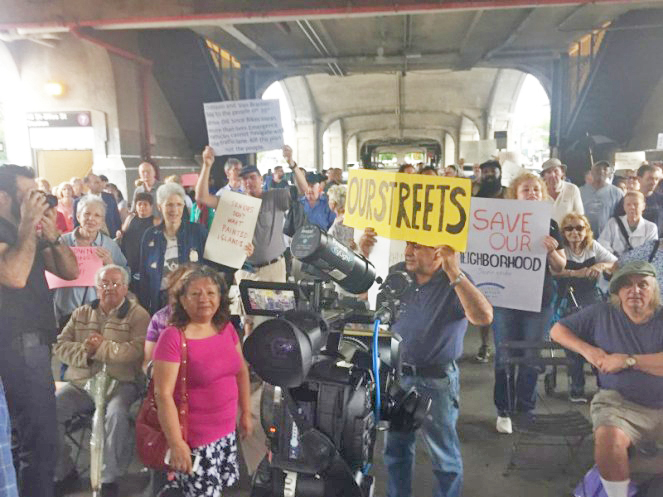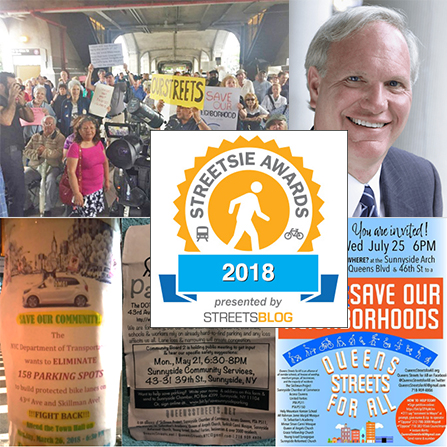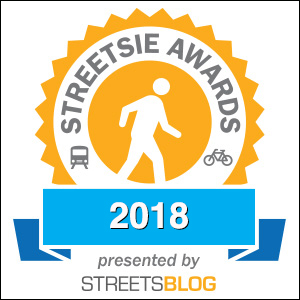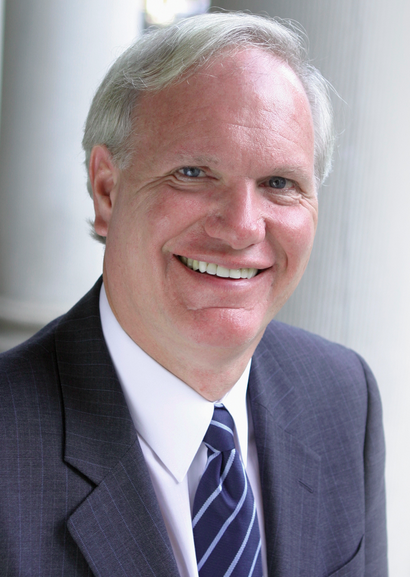Anti-bike NIMBYs — a tale as old as time.
NIMBYs — shorthand for “Not in My Backyard” — have reared their ugly heads in each of the 12 years since Streetsblog launched. The days of fighting for feet of space on Prospect Park West may be over, but as the city brings things like bus lanes and bike lanes to new neighborhoods, new NIMBYs are a perennial obstacle.
Even with the city adding more than 20 miles of protected* bike lanes per year and support for those bike lanes surging, 2018 was a marquee year to fight that things that, in the words of former Streetsblog Editor in Chief Ben Fried, "make cities tick."
For most of those car-owning NIMBYs, making streets safer for pedestrians and cyclists, and faster for scores of bus riders, isn't worth losing a few parking spots per block. Avoiding L train gridlock Armageddon isn't worth
With that, here are the nominees for the 2018 Streetsie for "NIMBY of the Year."
'Queens Streets for All' — Sunnyside's Parking Protectors
To understand the motivation behind “Queens Streets for All,” the Orwellian organization formed by Sunnyside business and community leaders to fight protected bike lanes on 43rd and Skillman avenues, one need look no further than the clever way their message changed over time:
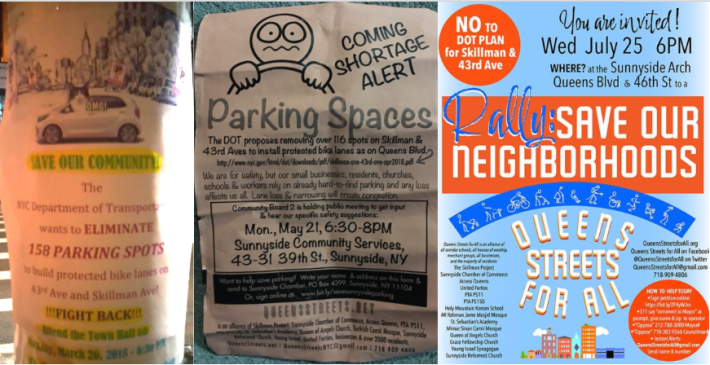
That’s right, even as they claimed the bike lanes would herald total retail collapse in the neighborhood, opponents were only ever concerned with one thing: unrestricted, free curbside access.
All bike advocates and the DOT wanted was a safe cycling connection between Queens Boulevard and points west. In response, bike lane opponents inundated them with vitriol: online comments and Facebook forums filled with thinly veiled homophobic attacks on TransAlt Queens Chairman Macartney Morris and Council Member Jimmy Van Bramer, who online critics claimed was only pushing the bike lanes to please his husband, a former TransAlt board member; repeated assertions that Gelacio Reyes, whose death spurred calls for the bike lanes, caused his own death at the hands of a drunk driver; discounting all bike lane supporters as "outsiders"; and below-the-belt tactics like demanding pro-bike lane-fliers be prohibited from community meetings yet allowing anti-bike lane-fliers to proliferate.
In the end, opponents found a champion in Rep. Joe Crowley — but the mayor defied him and the community board, and decided to install the project anyway. A few weeks later, Crowley was defeated at the polls (just a coincidence?).
Still, the vitriolic rhetoric made for unfortunate outcomes: Even after their defeat, opponents of the bike lane continued to disseminate falsehoods about a supposed increase in pedestrian injuries, a rash of business closures, and debunked concerns that emergency vehicles were being impeded by the bike lanes. And then in November, following a suggestion made earlier in the year in the comments on a Sunnyside Post article, someone (police have not found the culprit) tossed thumb tacks along the bike lane on 43rd Avenue.
It was a potentially deadly politically motivated attack on innocent civilians — which some likened to terrorism.
That's a lot of excitement for one nominee — defiant pro-car NIMBYs, a congressman defeated, an attack on innocent cyclists, angry business owners and a bold mayor. Hard to beat that for the Streetsie, but other nominees have a lot going for them, too.
Arthur Schwartz and the 14th Street Coalition
If you ask lawyer Arthur Schwartz and his allies in the West Village, their quixotic campaign against DOT's plan to improve bus and bike priority on 14th Street and 13th Street ahead of next year's L train shutdown could be equated to Jane Jacobs's legendary — and ultimately victorious — effort to stop Robert Moses from building an expressway through Soho.
Schwartz's repeated attempts to use public meetings to stir up drama all fell flat. At one meeting, he called DOT Commissioner Polly Trottenberg a liar to her face — which earned a sharp and immediate rebuke from City Council Speaker Corey Johnson. At another, he made sure he was the last person to speak, which meant he unloaded an impassioned and fiery diatribe to a mostly empty room.
In reality, Schwartz and company have done little more than create a seemingly endless stream of headaches for DOT and MTA bureaucrats tasked with managing what is essentially a 15-month long natural disaster. Through multiple lawsuits, they’ve yet to stop the project — but they’ve managed to scare DOT from pursuing more ambitious transit and bike-priority street designs.
Simply put, the busway and bike lanes are the only thing standing in between the city and gridlock Armageddon. Without them, L train riders who can afford to do so will opt for taxis — and the folks in 14th Street Coalition will be even worse off.
Tony Avella and Queens Community Board 11
DOT installed a protected bike lane on an Eastern Queens segment of Northern Boulevard in 2017, but opponents haven't given up their fight to get it removed.
For a year and half, Community Board 11 leadership has been fighting to replace the bike lane with a costly and insufficient sidewalk-grade pathway. Whereas DOT's bike lane replaced a car lane as a means of slowing traffic, opponents deny that speeding is a problem at all. In June, opponents rallied where they brandished catchy signs such as, "Honk if You Support the Community Board 11 Bike Lane Plan" and "We Want Common Sense Vehicular Traffic Patterns."
Opponents were supported by a few elected officials, including State Senator Tony Avella, who personally organized and attended rallies supporting the bike lane's removal. In his September primary, Avella was squarely defeated by former city Comptroller John Liu — self-professed cyclist and supporter of bike lanes.
The bike lane has been in for over a year at this point — maybe 2019 will finally be the year opponents accept that.
Manhattan Community Board 9's Carolyn Thompson
Thompson has been in the fighting bike lanes business for nearly three decades in Morningside Heights, as the former chairwoman of Community Board 9 and the current chairwoman of the board's transportation committee.
For 21 months, Thompson has stalled a committee vote on DOT’s relatively timid traffic-calming redesign of Amsterdam Avenue above 110th Street. To slow traffic on the deadly corridor, the design repurposes a travel lane in each direction for unprotected bike lanes, painted medians, and turn lanes.
All the while, Thompson stubbornly refuses to entertain the project. Even though the turn lanes would actually speed up traffic, Thompson refuses to accept that.
“All it’s going to do is slow traffic down,” she told Streetsblog in October. “Every time you say you’re taking out a lane, you’re slowing traffic down. I don’t care what they’re saying, it slows traffic down.” (Fact check: It does not.)
And the winner is...
Queens Streets for All, for its brilliantly Orwellian name and vitriol so unabashed that it apparently inspired a terrorist.
